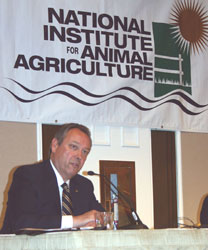We’ve been trying to document all the different pieces of state legislation out there that have impacts on the biodiesel industry. This blog entry posted by John Gartner on Autopia – Wired News, I think, kind of sums up what the effects might be if the 11 states… Florida, Connecticut, Missouri, California, Oregon, Mississippi, Arkansas, Nebraska, Montana, Tennessee and New Mexico… raise their biodiesel requirements from two to five percent, and other states look at reducing taxes on biodiesel:
You can view this as interventionist government messing with the free market for both food and fuel. Or, you can say it is the states creating a minimum market that ensures interest from growers and refiners to establish demand that is necessary to battle oil dependency (for national security reasons) or for environmental purposes.
Another option would be that states (or the federal government) could use their purchasing power to create the market. If all government vehicles used only biofuels, it would provide the certainty that producers need while reducing the effect on the free market. This is done all of the time with emerging technologies, so it shouldn’t be a surprise if it happens here.
Well said.


 A reader alerted us to the impending opening of
A reader alerted us to the impending opening of  Despite the support of Florida’s commissioner of agriculture for biofuels production, despite two recent ethanol history-making races held in the Sunshine State, and despite a new campaign that
Despite the support of Florida’s commissioner of agriculture for biofuels production, despite two recent ethanol history-making races held in the Sunshine State, and despite a new campaign that  The North Carolina General Assembly is considering a sweeping statewide strategic plan to strengthen North Carolina’s future in biofuels development and use.
The North Carolina General Assembly is considering a sweeping statewide strategic plan to strengthen North Carolina’s future in biofuels development and use. Biofuels and their impact on animal agriculture was the main topic at opening general session of the
Biofuels and their impact on animal agriculture was the main topic at opening general session of the  The keynote speaker was Bill Jones, chairman of
The keynote speaker was Bill Jones, chairman of 
 The plant is quite a boost to Keokuk as Tri-City Energy put its biodiesel plant in an old General Mills wheat processing plant that had been used just for storage for 30 years.
The plant is quite a boost to Keokuk as Tri-City Energy put its biodiesel plant in an old General Mills wheat processing plant that had been used just for storage for 30 years. A newly-completed study in Ontario shows that biodiesel could be an effective alternative fuel for farm operations in Canada. According to
A newly-completed study in Ontario shows that biodiesel could be an effective alternative fuel for farm operations in Canada. According to  “Our Government is committed to encouraging the development and use of renewable fuels,” said the Honourable Gary Lunn, Minister of Natural Resources. “Initiatives such as these play an important role in helping us achieve the government’s objective of five percent renewable content in transportation fuels by 2010. This is another example of how we can create new economic opportunities for farmers and the agricultural sector while also taking care of our environment.”
“Our Government is committed to encouraging the development and use of renewable fuels,” said the Honourable Gary Lunn, Minister of Natural Resources. “Initiatives such as these play an important role in helping us achieve the government’s objective of five percent renewable content in transportation fuels by 2010. This is another example of how we can create new economic opportunities for farmers and the agricultural sector while also taking care of our environment.” The
The